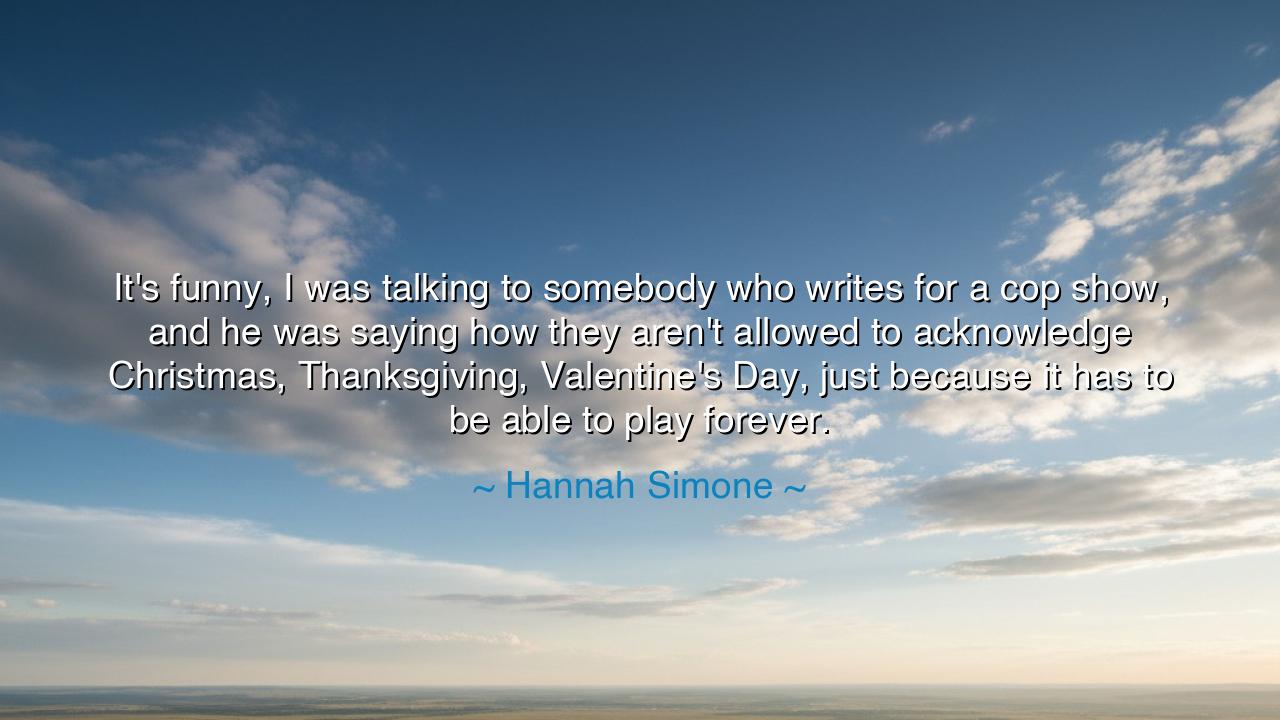
It's funny, I was talking to somebody who writes for a cop show
It's funny, I was talking to somebody who writes for a cop show, and he was saying how they aren't allowed to acknowledge Christmas, Thanksgiving, Valentine's Day, just because it has to be able to play forever.






In the thoughtful words of Hannah Simone, we are shown a glimpse into the strange rules of modern storytelling: “It’s funny, I was talking to somebody who writes for a cop show, and he was saying how they aren’t allowed to acknowledge Christmas, Thanksgiving, Valentine’s Day, just because it has to be able to play forever.” At first, these words seem like a lighthearted observation about television, but beneath them lies a profound reflection on the tension between time and timelessness, between the fleeting pulse of real life and the desire for stories that endure beyond seasons and years.
The meaning of her quote rests on the idea of permanence. Television, like all art, often seeks to live beyond its own moment. By avoiding ties to holidays—those markers of time and culture—a show is made “evergreen,” so that it can be played and replayed without appearing dated. Yet in this pursuit of timelessness, something human is lost. For holidays are not trivial; they are the milestones of memory, the rituals that shape our sense of belonging and history. To remove them is to strip away part of what makes stories feel alive.
The ancients knew this tension well. In the works of Homer, the heroes are lifted out of ordinary time and made immortal, their deeds sung for generations. Yet even within those epics, feasts, sacrifices, and rituals of the calendar appear, anchoring the divine tales in human rhythms. Contrast this with the timelessness of mythic figures like the Greek gods, who live outside the cycle of days and years. Their stories endure forever, but they lack the warmth of human festivals. So too with Simone’s reflection: a story designed to “play forever” risks losing the heartbeat of daily life.
Consider also the way Shakespeare wove both timeless and timely elements into his plays. His themes—ambition, jealousy, love—are eternal, but his details are rooted in the festivals, customs, and political climate of Elizabethan England. Because of this, his works breathe with both eternity and immediacy. They can be staged today and still resonate. Perhaps the lesson hidden in Simone’s anecdote is that while seeking eternal relevance, we must not forget that universality comes not by erasing time, but by embracing it in ways that reveal truths beyond it.
There is also a hidden warning here: when we erase Christmas, Thanksgiving, and Valentine’s Day from our art, we may inadvertently erase the rituals that bind human hearts together. These days are not mere decorations; they are vessels of memory and tradition. A cop show without them may endure on the airwaves, but it risks becoming detached from the reality of human life, which is marked by feasts, anniversaries, and celebrations. To be timeless at the cost of truth is to create a shadow, not a mirror, of life.
The lesson for us is that while we may strive for permanence, we must not fear the marks of time. Just as families repeat their rituals year after year, telling the same stories around the fire, so too should our art dare to be specific, even if it dates itself. Eternity is not gained by removing time’s details, but by filling them with meaning so deep that they speak across generations. The Pilgrims’ first Thanksgiving was a specific meal in a specific year, yet its story echoes centuries later because of the universal gratitude it embodied.
Practical wisdom flows from this. Do not be afraid to anchor your life and your stories in the rhythms of real days and real seasons. Celebrate your rituals openly, even if they seem ordinary. Do not seek to live in such a way that every moment is abstract and “forever.” Instead, live in such a way that the details of your days—your feasts, your gatherings, your observances—become timeless because of the love, gratitude, and humanity they embody.
Thus, the words of Hannah Simone, though born of television’s peculiar demands, carry an ancient teaching: that eternity without time is hollow, but time lived with meaning becomes eternal. Let us therefore not fear the holidays, the anniversaries, the fleeting markers of the calendar. For it is through them that we root our stories in humanity, and in so doing, allow them to live forever.






AAdministratorAdministrator
Welcome, honored guests. Please leave a comment, we will respond soon